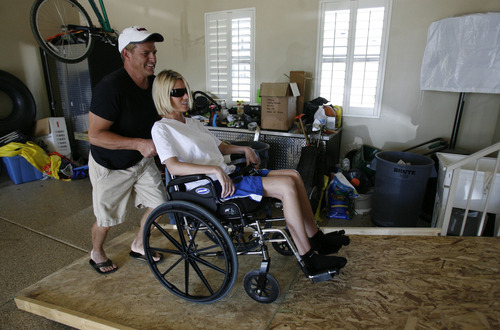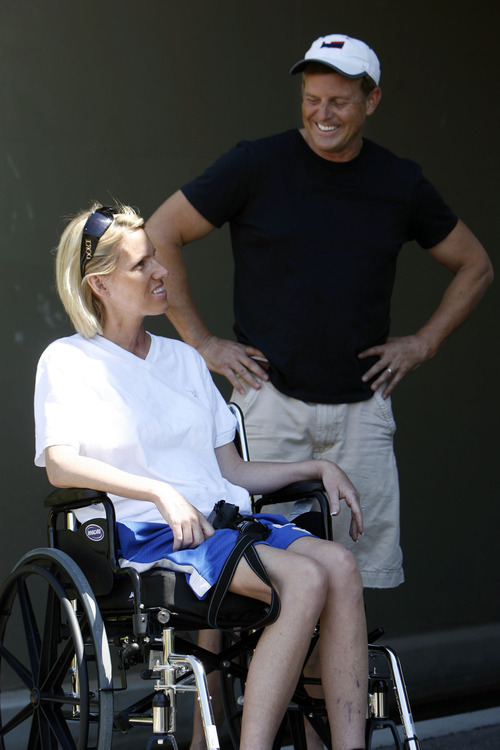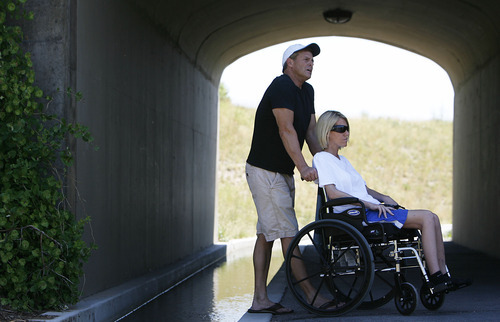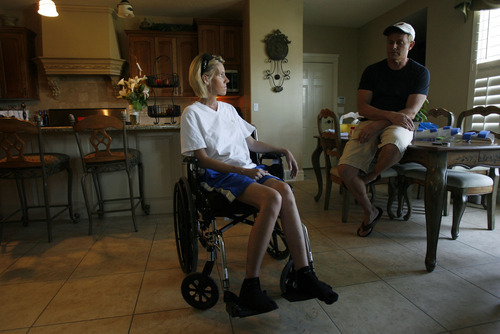This is an archived article that was published on sltrib.com in 2011, and information in the article may be outdated. It is provided only for personal research purposes and may not be reprinted.
South Jordan • Surrounded by doctors, Stephen Eldredge stood in agony in Hawaii.
The early June trip was supposed to be a vacation in paradise for him and his new wife, Shelli — a love he had married just six months before — and her two teenage sons. It was an annual trip he and Shelli usually made in December, but this time it was as a new family.
Now, as he looked over his wife's battered, comatose body, he struggled with the doctors' advice: Should he take Shelli off life support?
As he recalled the emotions surrounding his decision recently at his South Jordan home, he took a long pause.
"I just couldn't do it," Stephen said. "I never even presented the options to her sons or her father, who were there. We just chose to pursue forth at all costs."
After 17 surgeries in two months, Shelli is home and expected to make a full recovery.
"She is completely coherent, she has her wonderful personality, her wonderful sense of humor," Stephen says, looking sweetly at his wife in her wheelchair. "She moves everything; she feels everything."
Responds Shelli: "I just see a miracle."
—
The accident • Stephen, 50, worked in the medical field; Shelli, 40, in real estate. The two crossed paths while Stephen was shopping for a home.
She sold him on one thing, but it wasn't the home.
They dated for a couple of years and married in January. Shelli liked to water-ski and be outdoors. The couple loved to travel and planned to elope in Hawaii in December but decided against it at the last minute and got married in Utah. They instead exchanged the airline tickets for a summer vacation.
The family rented mopeds to ride caravan-style on Kamehameha Highway, which hugs the eastern coast of Oahu's He'eia State Park, with Shelli holding up the rear.
Soon, Shelli's 17-year-old son noticed she was no longer behind him. The family circled back to look for her and found her bleeding heavily, her now-contorted body wrapped around a telephone pole in a ditch.
She was not wearing a helmet.
Her son took off his shirt and carefully wrapped it around her head to soak up the blood.
Stephen — a doctor and anesthesiologist with training in trauma and critical care — arrived shortly after his son. As his wife cried in frustration and pain, he asked an onlooker to call 911 again and walked them through requesting a helicopter to dispatch. He noted her condition and made sure her bones and spine were safely positioned and supported while he waited 25 minutes for an ambulance to arrive.
"It seemed like forever," he said.
The helicopter never came.
—
Faith and hope • By the time she made it to the hospital, Shelli's heart had stopped beating. Doctors monitored her brain activity for three days, looking for any signs indicating a potential recovery. Activity was nearly nonexistent.
"She was basically as close to flat line as you can describe," Stephen said. "As a trauma physician, I couldn't believe she survived impact. I couldn't believe she survived the fat embolism as it attacked her heart and lungs in Hawaii, and I certainly couldn't imagine her waking up with full cognition."
Shelli was in a coma, on life support and not expected to survive. She had nearly 50 bone fractures from the top of her body to the bottom. She suffered cerebral fat embolism syndrome, which caused thousands of mini strokes in her brain. She was also 2½ months pregnant but miscarried because of the crash.
For more than two weeks, Stephen monitored his wife's recovery.
Every day, when hospital visiting hours would end, he and the boys left the hospital for dinner near the shoreline.
What many would consider a dream dinner on the coast was to them a burden.
"It was the most hollow existence I can remember," Stephen said.
As the sun began to set over the waves crashing nearby, he watched the palm trees sway in the gentle breeze and could only think, "I wish Shelli was here to see this."
With the prognosis for his wife's survival bleak and fading fast, doctors urged Stephen to take her off life support.
Despite his faith and hope for her recovery, he realized the damage to her brain was so severe that if she ever came out of a coma, her life would never be the same.
"It was frightening," he said. "I was worried that I may have caused her to be imprisoned in a body that would have tremendous limitations."
—
A miracle • Shelli underwent 17 surgeries from June to late July. After a couple of weeks at The Queen's Medical Center in Honolulu, she was taken to Utah's University Hospital for specialized care at the beginning of July. She was now physically closer to home and family but still in a coma.
Days later, a miracle happened.
Stephen chatted in the neurointensive care unit with his sister and a friend about the family dogs. His sister joked that Shelli wouldn't wake up until Stephen taught the couple's two Pomeranians to go to the bathroom outside, so she wouldn't have to clean up after them.
"Suddenly, she opens her eyes and smiles," Stephen said.
He asked if she could hear them.
Shelli raised her eyebrow.
"We just all burst into tears. We all just started crying," he said. "That was the beginning of me never leaving her side."
From that day there has been steady progression.
Shelli recalls a few details before the crash, but not the actual accident. The family believes she was a victim of hit-and-run. Police were unable to confirm whether anyone else was involved.
But she vividly remembers the emotions that flooded her mind shortly after coming out of the coma and learning of the difficult decisions her husband had faced.
"I just felt so bad for Steve and everything," Shelli said softly as she began to cry. "The decisions he had to make, and what my kids saw and what they went through."
Stephen says medical professionals can't explain the healing of Shelli's brain or how she recovered. But the couple, both members of The Church of Jesus Christ of Latter-day Saints, thank a higher power and priesthood blessings, which told her she would live and walk again.
"I think a lot of that has to do with blessings from on high and with her constitution — she is a fighter," Stephen said. "She does not lose at anything."
Doctors who treated Shelli were not available for comment on her recovery, but a 2010 case report in the Journal of Computer Assisted Tomography states the severity of cerebral fat embolism syndrome is "variable and the outcomes range from complete recovery to death." Up to 15 percent will die, and for those who live, up to 86 percent have brain damage. A woman in the report suffered permanent severe neurological damage that left her conscious but mentally and physically disabled.
Shelli recently completed speech therapy and continues a routine schedule of two-hour occupational and physical therapy sessions about three times a week.
"You gradually realize some of your limitations," Shelli said. "You are like, 'Oh no, how do I get my whole life back?' "
But she doesn't let that get her down.
"I'm so happy," Shelli said. "I know it will be a lot of hard work to get me fully walking and everything, but at least I am up and awake, and I feel like I can do it."
As of late last week, Shelli is also walking again.
Her family is happy to have her awake, too.
"It is beyond miraculous," Stephen said as he smiled, pushing Shelli in a wheelchair near their home. "We were worried that she would never wake up, and to have her back with full faculty of thought — it is wonderful."
cimaron@sltrib.comTwitter: @CimCity —
View video
To view a video of Shelli Eldredge's recovery and portions of an interview, go to www.sltrib.com











